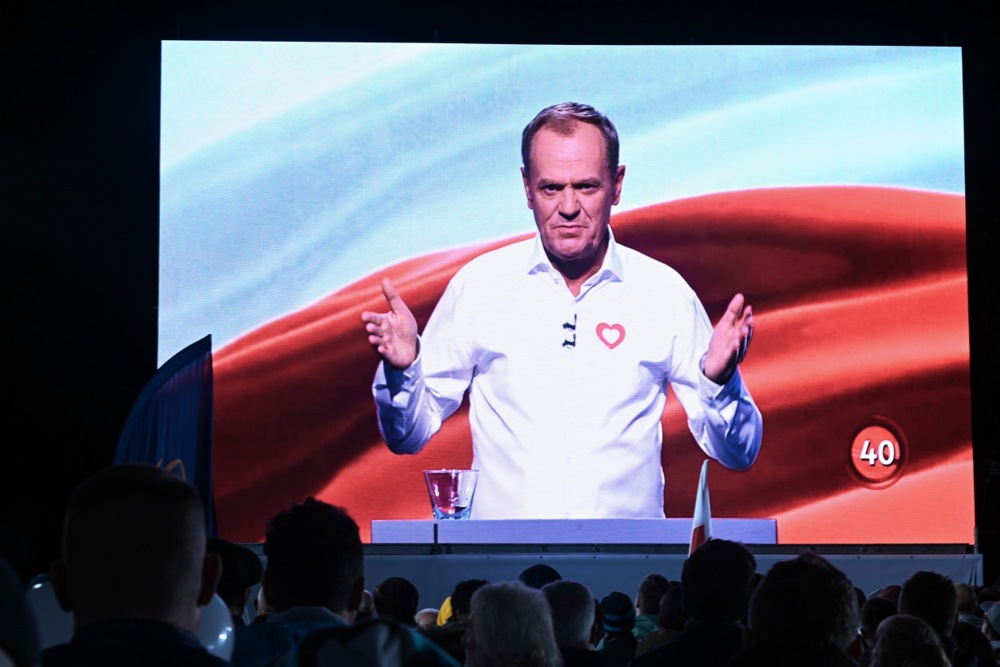In eight years under PiS rule, Poland faced a constitutional crisis, restricted abortion rights, grappled with the Covid crisis, experienced one of the highest inflation rates in the EU, witnessed the most brutal war on the European continent since World War II, and clashed with the EU leading to the blocking of tens of billions in EU funds. Additionally, 2023 saw a decline in economic growth.
Despite these challenges and numerous accusations against PiS, Donald Tusk of Civic Platform, who many expected to triumph in this political environment, did not. Instead, the support for Civic Platform in the general election rose by a mere 2.6 per cent from their 2019 defeat, stagnating at 30 per cent.
If the opposition garnered a majority, it wasn’t because of Tusk — it could even be argued that he was a drawback. Contrarily, PiS achieved results just 1.5 per cent lower than their 2015 success. The current opposition would need to form a very complicated anti-PiS three-parties coalition to govern.
Donald Tusk’s performance can be viewed as a first vote of no-confidence. Past wins for Civic Platform were on a different scale. In 2007, under Tusk’s leadership, they secured 41.5 per cent of votes (compared to PiS’s 32 per cent), and 39 per cent in 2011 (versus PiS’s 30 per cent). In 2019 and 2015, they garnered 24 per cent and 27.4 per cent respectively. Now, they hover just above 30 per cent. Those who might have supported Civic Platform chose instead the Third Way.
The deluge of criticism from PiS towards Civic Platform’s leadership appears to have achieved its goal: stalling Civic Platform’s progress and dividing the opposition.
While many anticipated Konfederacja to emerge as a notable third force, their extremist neo-liberal and staunch nationalist views puzzled many. This role of equilibrium was finally assumed by Third Way, which is an alliance between two authentically centrist parties: the PSL (the Polish People’s Party) and Poland 2050.
PSL, often translated as the “Polish People’s Party”, has its roots in the agrarian movements of the late 19th and early 20th centuries. It was formally established in 1895. Throughout its history, the party has undergone various transformations and name changes but has consistently represented the interests of Poland’s rural communities and farmers.
PSL’s ideology is primarily agrarian and Christian-democratic. The party is generally considered center-Right on economic issues, advocating for a mixed economy with a blend of free-market principles and state intervention to support farmers. On social issues, it tends to be centrist or center-Right, reflecting the conservative values of its rural base, though it has shown some flexibility over time.
Polska 2050, or “Poland 2050,” is a relatively new political movement. It was established in 2020 by Szymon Hołownia, a well-known journalist, author, and former presidential candidate.
Hołownia ran as an independent in the 2020 presidential elections, and his significant support base led to the creation of this new political force. The party can be broadly categorised as centrist – a mixture of social-liberal and christian democratic tendencies with green politics influences, centrism at its best.
The party focuses on modernising Poland and seeking to make it ready for challenges of the future, hence the reference to “2050” in its name. It seeks to bridge the gap between Poland’s conservative and liberal forces. It endorses sustainable development and social solidarity, while leaning towards a more progressive stance than Poland’s current conservative establishment on social issues.
The Third Way is open to forming a coalition with the Civic Platform (and clearly rejects a coalition with PiS). It holds a sufficiently strong position to implement some of its proposals. The programmes of both parties are not mutually exclusive; in fact, they might align rather than clash. How both political formations will tolerate the social programme of the Left as an unavoidable coalition partner remains an open question.
Civic Platform is vague, or even lacks interest, in defence matters. Third Way intends to support domestic defence industries and integrate the Territorial Defense Forces (WOT) into the Armed Forces command system. There are no comparative details available regarding the Civic Platform’s stance on these matters.
PiS has highlighted Civic Platform’s lack of action on defence. During their previous coalition with PSL, Civic Platform actively collaborated with Russia. It was during this period that Poland chose not to proceed with the installation of the American missile defence shield, forgave a debt of 1.2 billion zlotys owed by the Russian company Gazprom, refrained from obstructing the construction of the Nord Stream 2 gas pipeline, sold the Możejki refinery to Russia, disbanded a significant number of military units in eastern Poland, and delegated the investigation into the Smolensk disaster to Russian authorities.
These actions severely undermined Donald Tusk’s credibility. It’s reasonable to expect that Third Way will proceed with caution to avoid similar pitfalls.





Did PiS or Civic Platform win Poland’s election? The answer is not a simple one. Don’t expect Tusk to be PM any time soon